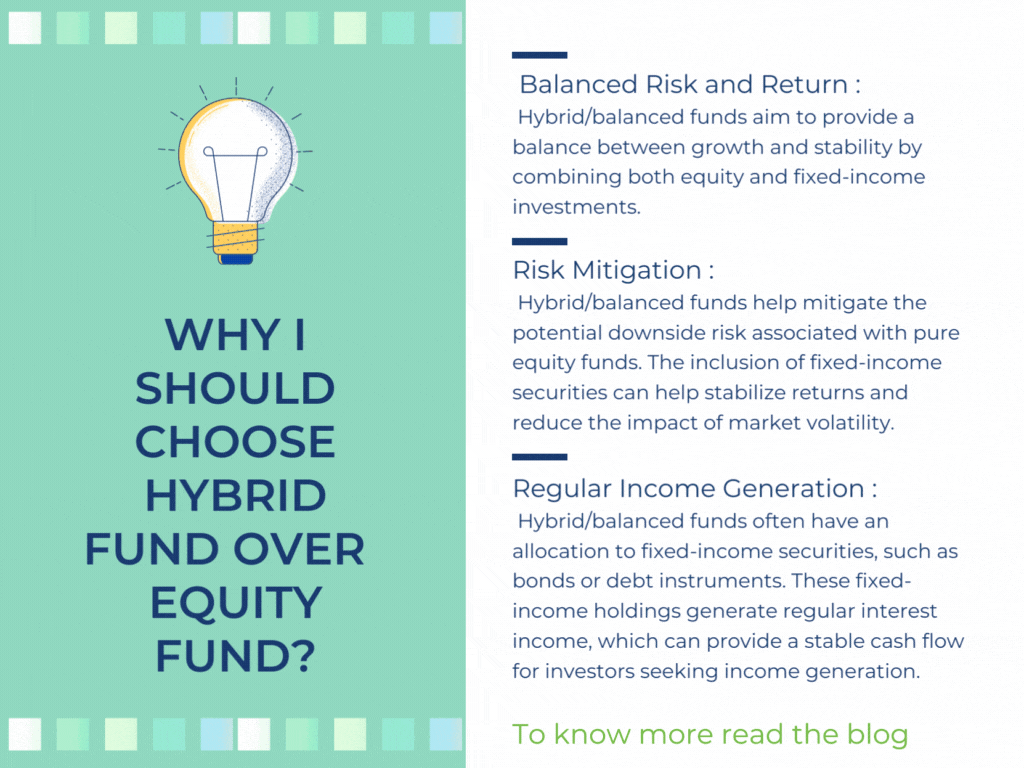Why I should choose Hybrid/Balanced fund over Equity fund?
Choosing a hybrid/balanced fund over an equity fund depends on your investment goals, risk tolerance, and desired asset allocation. Here are some reasons why you might consider investing in a hybrid/balanced fund:
Balanced Risk and Return: Hybrid/balanced funds aim to provide a balance between growth and stability by combining both equity and fixed-income investments. These funds typically allocate a portion of the portfolio to equities for growth potential and another portion to fixed-income securities for stability and income generation. By investing in a hybrid/balanced fund, you can achieve a balanced risk-return profile, which may be suitable for investors seeking moderate risk exposure.
Risk Mitigation: Hybrid/balanced funds help mitigate the potential downside risk associated with pure equity funds. The inclusion of fixed-income securities can help stabilize returns and reduce the impact of market volatility. This diversification can provide a buffer against significant market swings, making hybrid/balanced funds potentially less volatile than equity funds.
Regular Income Generation: Hybrid/balanced funds often have an allocation to fixed-income securities, such as bonds or debt instruments. These fixed-income holdings generate regular interest income, which can provide a stable cash flow for investors seeking income generation. If you prioritize regular income along with potential growth, a hybrid/balanced fund might be more suitable for your investment needs.
Diversification: Hybrid/balanced funds offer diversification across different asset classes, including equities, bonds, and other fixed-income instruments. This diversification helps spread the risk across multiple investments, reducing the impact of any single security's performance on the overall portfolio. By investing in a hybrid/balanced fund, you gain exposure to a mix of asset classes, potentially improving the risk-reward profile of your investments.
Simplified Portfolio Management: By investing in a hybrid/balanced fund, you delegate the task of asset allocation and portfolio rebalancing to the fund manager. This can be beneficial if you prefer a more hands-off approach to managing your investments. The fund manager adjusts the asset allocation based on market conditions and investment objectives, saving you time and effort in managing a diversified portfolio.
Lower Volatility: Hybrid/balanced funds tend to have lower volatility compared to equity funds. The inclusion of fixed-income securities can help stabilize returns and reduce the impact of market swings. If you have a lower risk tolerance or seek more stable investment performance, a hybrid/balanced fund might be more suitable for you.
Flexibility and Customization: Hybrid/balanced funds offer different variations and strategies, allowing investors to choose funds that align with their risk tolerance and investment goals. Some hybrid funds lean more towards equities, while others have a higher allocation to fixed-income securities. This flexibility allows you to find a fund that suits your specific needs and preferences.
However, it's important to consider the following points when comparing hybrid/balanced funds to equity funds:
Lower Growth Potential: Hybrid/balanced funds may have lower growth potential compared to equity funds. The inclusion of fixed-income investments can limit the upside potential offered by equities. If your primary investment goal is long-term capital appreciation, equity funds historically have the potential to deliver higher returns.
Interest Rate Risk: Hybrid/balanced funds that include fixed-income securities are subject to interest rate risk. When interest rates rise, the value of fixed-income securities may decline, affecting the overall performance of the fund. It's important to consider the interest rate environment and the fund's strategy in managing interest rate risk.
Customization Constraints: While hybrid/balanced funds offer a blend of asset classes, the specific asset allocation and investment decisions are made by the fund manager. If you have a particular asset allocation in mind or prefer to have more control over your investments, constructing a customized portfolio using individual equity and fixed-income funds might be more suitable for you.
Ultimately, the decision between hybrid/balanced funds and equity funds should be based on your individual financial goals, risk tolerance, and investment preferences. It can be beneficial to diversify your portfolio across different asset classes to achieve a balance between growth potential and stability. Consulting with a financial advisor can provide personalized guidance based on your specific needs and circumstances.


